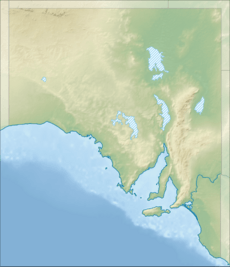Calpatanna Waterhole Conservation Park facts for kids
Quick facts for kids Calpatanna Waterhole Conservation ParkSouth Australia |
|
|---|---|
|
IUCN Category Ia (Strict Nature Reserve)
|
|
| Nearest town or city | Streaky Bay |
| Established | 14 February 1974 |
| Area | 36.44 km2 (14.1 sq mi) |
| Managing authorities | Department for Environment and Water |
| Website | Calpatanna Waterhole Conservation Park |
| See also | Protected areas of South Australia |
The Calpatanna Waterhole Conservation Park is a special protected area in South Australia. It's located on the Eyre Peninsula, about 25 kilometers (15 miles) south-east of the town of Streaky Bay. The park covers parts of the areas known as Calca, Mortana, and Yanerbie.
About Calpatanna Waterhole
The park gets its name from the Calpatanna Waterhole, which is found inside its boundaries. This waterhole is an important feature of the park.
When the Park Was Created
The Calpatanna Waterhole Conservation Park was officially created on 14 February 1974. This happened under a state law called the National Parks and Wildlife Act 1972. More land was added to the park on 16 July 1985. As of July 2016, the park covers an area of about 36.44 square kilometers (14.07 square miles).
What the Park Protects
In 1980, experts described the park as a moderately large area that protects a type of dry scrubland. This scrubland is typical of the western coast of South Australia. The park also has seasonal salty lagoons, which are like small lakes that fill up with water during winter rains. These lagoons help make the park a home for many different kinds of plants and animals.
Plants and Trees in the Park
A major type of plant found near the salty lagoons is the Melaleuca halmaturorum, which is a tall shrub. However, the main type of plant life in the park is a mallee scrub. Mallee is a kind of eucalyptus tree that grows with many stems from the ground. Common trees here include Eucalyptus diversifolia, E. socialis, and E. gracilis. Other plants like Melaleuca lanceolata and Exocarpus species also grow in the park.
Park Condition
Even though the land in the park was used for grazing animals in the past, it is now in good condition. It represents the natural plant life of the region very well.
Park Protection Status
The Calpatanna Waterhole Conservation Park is classified as an IUCN Category IA protected area. This means it is a "Strict Nature Reserve." These areas are protected very strictly to preserve their natural state. They are mainly used for scientific research or environmental monitoring. In 1980, the park was also listed on the Register of the National Estate, which was a list of places important to Australia's natural and cultural history.
 | Toni Morrison |
 | Barack Obama |
 | Martin Luther King Jr. |
 | Ralph Bunche |


